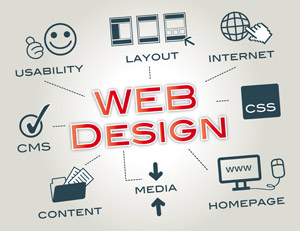CREATE A WEBSITE
Create Your Web Advantage
In the digital world of today, no matter what business, you definitely want to create a website. You may have quite literally a brick and mortar business like kitchen remodeling and home reno. More figuratively, you may be what we call a brick and mortar store, or you may be a manufacturing company or serve in the health sector. You still want to have an advantage of the web. What you want is a website for your business.
Well, the intent of this article is not to list the 10 features you must have on your website. Nor the top 20 hosting providers and not even the most optimum software platform to choose from for your website. Those are choices and decisions to be made after some fundamentals are taken care of.
What we are talking about here is going back to the basics.
WHERE DO YOU START?
The answer to this seemingly simple question as you will see, is not trivial. In fact it merits going back to the basics of defining what your business’ requirements are. It needs to be dealt with equivalent solemnity.
So, you want to create a statement on the web?
You need an online presence that speaks to your solutions. Your business wants to provide the answers your clients are looking for and when they need them. Effectively communicating the promise your business holds is of paramount significance; it is the brand promise.
Or, is it that you have a long dormant website which you want to refresh and refurbish? Now that we know what the business needs, lets look at the context, the landscape vis-à-vis our objectives.
The Landscape, the Context and the Objectives
At the time you are reading this post, there are well over a billion websites online. Yes, you can get your design inspiration from several websites. Each with its own character, its flavour and its personality. Categories of websites abound as well. It would surely not be out of place to say, “It takes all kinds to make the world”; ‘on the web’, I may add!
Needless to say you are entering a crowded market place. And it is also constantly evolving.
The one common denominator that is quite the equaliser though; each website needs to serve its purpose and for that reason must perform well for its intended use. So, whatever the kind and nature of your website, you want to get the most out of it.
With our experience in this space, I can say, it is all up to you what you make of your website. You can create a website and leave it there as a mere notional online presence. A brochure of your business.
Or, to your advantage you can recognize this potent tool for what it could be worth; as a gateway to incredible business growth and success. So, once again to the Big question…
The BIG question is: Where do you start?
Are you wondering what you need to think through in order to define the features and functions of your website? Without wanting to sound simplistic, we’d boil this down to 2 critical aspects.
- Getting clear on the objectives and focused on the purpose is a great place to start. This leads you to define the fundamental needs and requirements of your website.
- And the second most important step? You also need a design that maps your requirements to the functional elements and positions the website for performance amidst competition and the evolving online environment.
When you see a website, you see the branding, the colour, the copy and the fonts, its graphic design, the pictures, and videos. However, these comprise only the presentation of the web
Let’s look at the Analogy
If you were building a house, what you’d look for is a strong foundation, a functional architecture that best serves the needs of its occupants and a robust framework. You would not start with the interior design, the colour of the walls, the type of drapes and the upholstery for your living room or what decorations you may want for your entrance and the family room. Would you?
Back to the Website
Sometimes costs may constrain the kind of website you build. That is entirely an operational decision. However, even with the economic constraints it is advisable to not ignore the criteria for success. It is better to lay a robust foundation that can scale up optimally as finances permit in due course.
The intent here is to bring out two crucial inputs to take the right step forward to build your valuable asset online.
1. REQUIREMENTS DEFINITION
Through multiple years of dealing with several large software development projects and digital programs, I have seen more often than one would imagine, stakeholders tend to gloss over predominantly important aspects of requirements definition jeopardising the success of projects. And, software development teams cannot shirk the ‘mea culpa’ either.
Culled here, are ‘the must answer’ questions for drawing up your website requirements. Answers to these questions need to dive deeper into the goals, objectives and the purpose. I’d like to recall my earlier post, “Start at the end and reach a great beginning“. These questions cannot and should not be answered casually.
- Who is your audience?
- Do you have tactical or strategic intent for your website?
- List the strategic goals for your website?
- What are the measurable success criteria for your website?
- And, what actions do you want your website to inspire?
- Have you defined your brand and your offerings with accuracy?
- Does your site integrate with other tools / systems for marketing?
- Is your content strategy defined?
- What do you want visitors to do when they visit your website?
With these questions answered we know you are on your way to establishing a strong foundation for your website to build upon.
To make it more practical and actionable, here’s a checklist for requirements definition that I hope, will prove a handy tool to work with.
2. DESIGN CONSIDERATIONS
 When working with ReignSearch, you will recognize that we are a creative agency which has at its foundation, strong cross functional background and tremendous experience in complex software development projects.
When working with ReignSearch, you will recognize that we are a creative agency which has at its foundation, strong cross functional background and tremendous experience in complex software development projects.
Creativity remains paramount. With ReignSearch you will also experience the inherent maturity of processes in our work; the principles of good engineering practice go hand in hand with staying abreast of the latest developments in the field of digital marketing.
Just as in requirements, I am presenting key design criteria that are ‘must have considerations’ for a complete design of a website. The intent is, again, not to discuss the technical details of design. The approach is to present a framework. So, you as a website owner are equipped to govern the design decisions that will impact the success of your website. With this in mind, I am listing the fundamental design considerations.
-
Functional Design and Information Architecture
Functional design clearly maps back and without any loss to the functional requirements of the website. Further its information architecture stems from the navigational requirements of the website; how a user would navigate across various pages and features of the website, all this geared to helping your website visitor find the information he / she is looking for with the most ease.
-
Integration
A website does not exist and operate in isolation. Its function is to integrate with other efforts, processes, systems and software of the business and achieve synergies. More importantly, efforts and processes include those of the sales team, other marketing events and advertisements, direct marketing and product launches to name a few.
-
Scalability
Your website may start as a humble informative brochure to begin with. As finances permit and the business needs arise, you’d want your website to become a scalable entity without having to overhaul the design completely or to scrap an existing website. Likewise, data storage and speed of response may depend on the scale of usage statistics which will need to be estimated appropriately to design for scalability.
-
Security
From the very beginning a website needs to establish trust with its visitors and secure credibility in the eyes of its audience. Security from malware attacks and hackers’ mal-intentions is just as important as the site visitors’ experience of transaction security.
-
Maintainability and Change Management
Any website is a piece of software that represents the business and its transactions. As business evolves the website needs to keep up with the changing and / or growing needs. Easy maintainability and change management significantly reduce the recurring costs. Therefore it is only prudent to evaluate the trade-offs and decide upon the design considerations at the very outset.
-
Reliability and Availability
The one and the most significant difference between the physical business and an online business is the 24X7 presence of the latter. You need infrastructure that is reliable, so the website is available when needed. Choosing the right hosting service and a provider with the right wherewithal to support this requirement is vital.
-
Technical Performance
Given the website represents business, it needs to be customer friendly and customer ready at all times. Needless to say, the speed of the website translates to high quality user experience. And, this does not go un-noticed in the eyes of the dominant search engine, Google. Therefore, performance in terms of speed of rendering and speed of response cannot be overstated in any circumstance, irrespective of the device on which the website is accessed; desktop or the mobile.
-
Search Performance
Search performance goes back to where we began with defining the purpose of the website; to reach the goals of its business, that of acquiring more and more visitors, leads and customers.This can happen only when a website performs well in searches.Amidst the growing number of websites online, amidst the competition and clamour for attention, for your brand to perform well in searches, you cannot just create a website. It needs to be positioned so. And this starts with search engine optimization of the website and choosing the right agency or SEO Expert for your work.
-
Content Performance
Though last, definitely not the least important. Content is at the heart of value delivery to website visitors. Business information, answers to questions, product and service details, prices, the brand narrative, points of key differentiation and above all, calls to actions that lead to productive engagement are all dependent on the quality of the content. Authentic content speaks to the brand and speaks to its promise with authenticity. Performing content is paramount to website success.




Leave A Comment